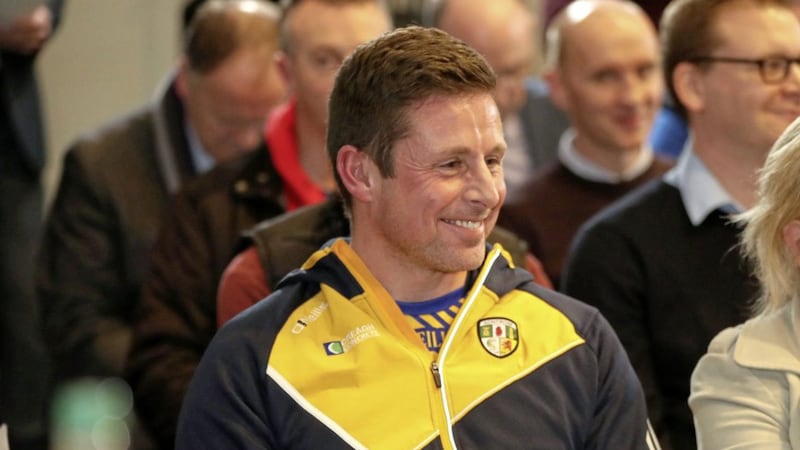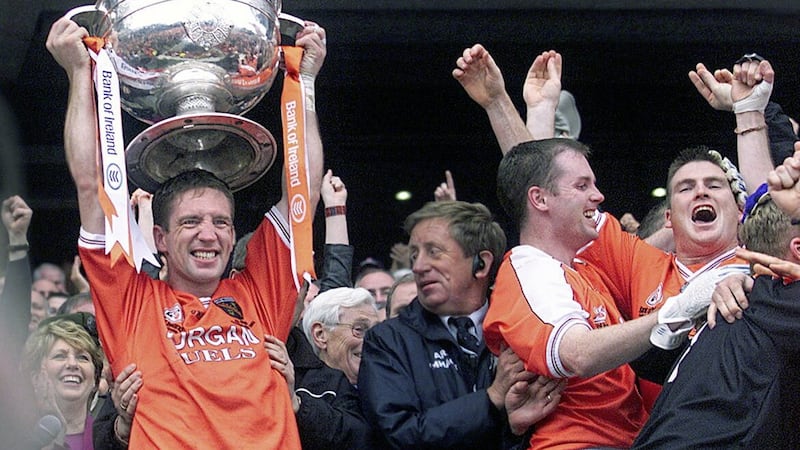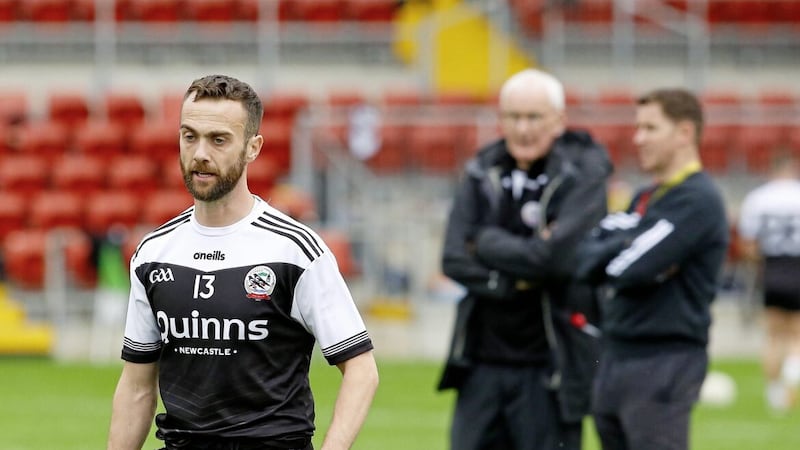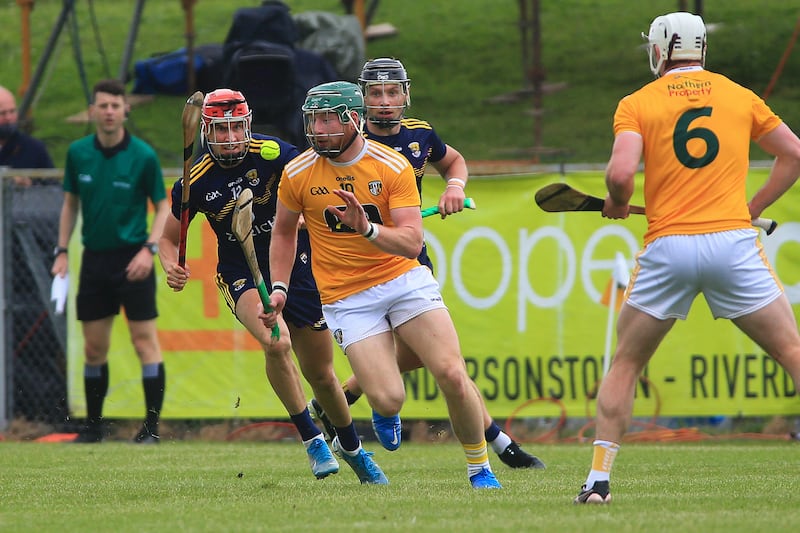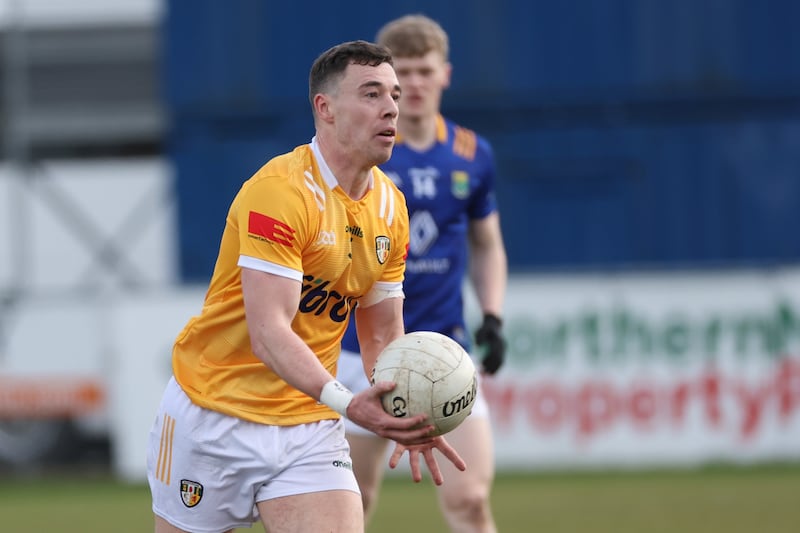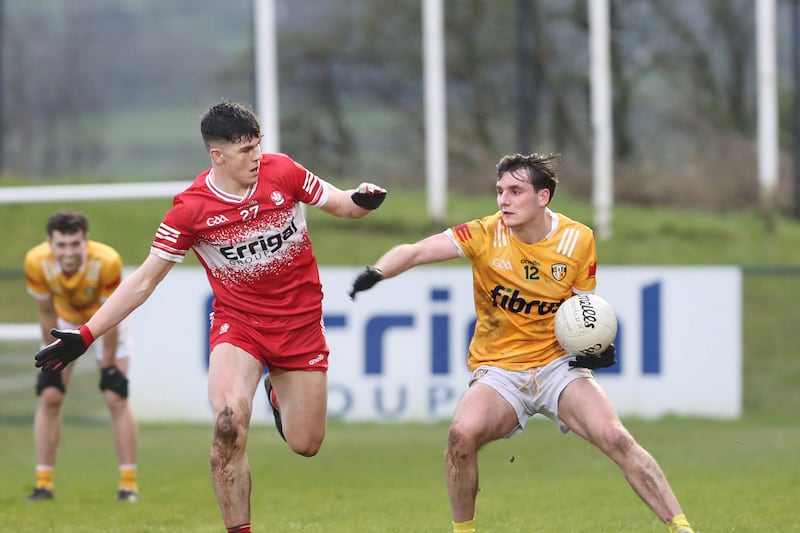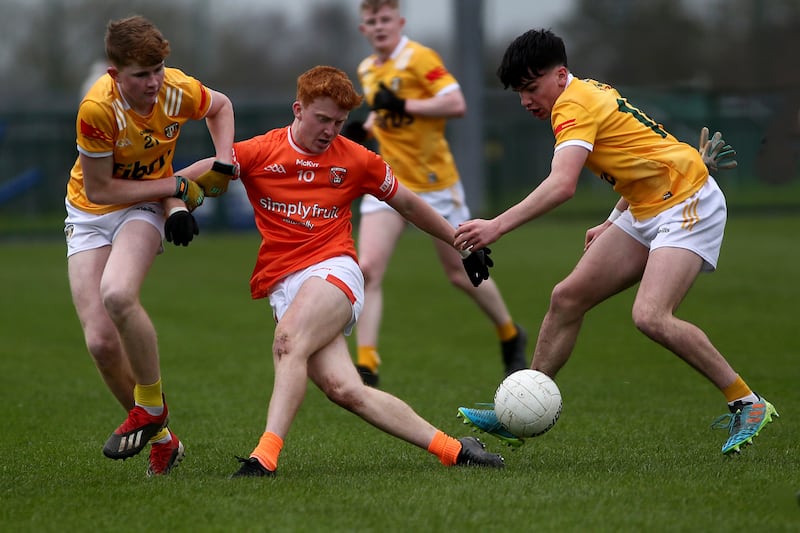LONG days in Long Kesh. From sunrise to sunset the same bearded faces, the same barbed-wire fences. Caged-in, prisoners kicked their heels and thought of home and of ways to pass the time.
Gaelic Games were a welcome diversion for the “men behind the wire” and Gerry Adams was an eager participant in them.
He’d played hurling and football during his school days but by the time he reached his late teens in the late 1960s, his focus was fairly and squarely on the political activism that shaped his public life as leader of Sinn Fein.
Perhaps in different circumstances he would have made his name as a county player?
His son Gearóid doubts that: “He’d tell you he was a class hurler but I haven’t seen much evidence of it,” he says with a chuckle.
In 1973, Gerry Adams was arrested and interned at Long Kesh and after an unsuccessful escape attempt he was sentenced to a term of imprisonment.
It was packed with young men like him. Inter-cage football matches and cage-versus-cage games were organised and, for as long as they lasted, the players’ minds escaped to playing fields from the Springfield Road to South Armagh.
“There were very lively football games between the different cages and I remember in Cage 11 we tried to get hurling sticks in but they wouldn’t let us,” Adams recalls.
“So a bunch of us led by a guy called Terry ‘Cleaky’ Clarke cut down the bits of wood around the huts and we made hurls. It was just boxwood and they broke very quickly but we made the point - we had one game of hurling behind the wire.”
Several members of Antrim’s 1969 All-Ireland-winning U21 team, including Liam Boyle (the captain) and Mickey Culbert, spent time in Long Kesh and, although the inmates were mostly from the six counties, there were men from Dublin, Limerick, Clare and other parts of the island there too.
“There was a huge interest in Gaelic Games and huge rivalry between the different counties when it came to the Ulster final and even between different clubs,” says Adams.
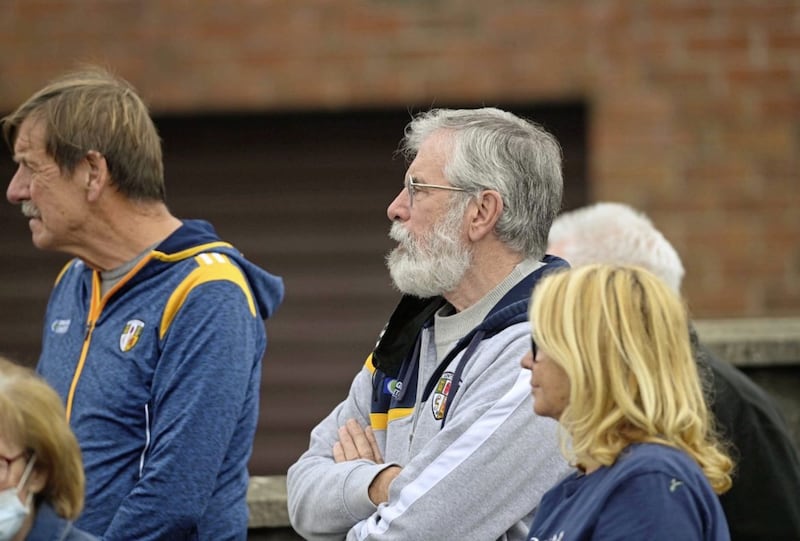
“Most of the Hunger Strikers were accomplished players – Kevin Lynch most famously, he had captained the Derry minor hurling team - so there was a very lively interest in Gaelic sports; it was a way of passing the time.
“I played for all the school teams I went to. I started getting involved with the Republican movement around 1965-66 and then increasingly in 1967, ’68 and ’69. While I’ve always retained and interest in Gaelic Games, my own playing career was short but my proudest achievement is that I played in the St Mary’s (Christian Brothers Grammar School) team and Aidan Hamill (Antrim U21 All-Ireland winner) was my captain.
“We all think we were better than we actually were, but my playing career, such as it was, gave way to political activism and all that went with it.”
As the Troubles raged throughout the bloody years of the 1970s and ’80s, the roots of the GAA clung to stony ground around the North. Facilities were poor, media coverage practically non-existent (apart from The Irish News) and the constant threat from the security forces and loyalist paramilitaries loomed large.
Jobs were scarce and young men left for London or Boston in their droves. Despite all of that, the games were played.
“One thing that struck me during the conflict was that the GAA kept going through it all,” says Adams.
“Particularly in places like Belfast where things were very, very tough, people still diligently got the kids to the training and the matches and the myriad of tasks from washing the geansais to all the mentoring and fundraising.
“It’s a beautiful representation of the volunteer spirit – that sense of the meitheal, good active citizens all helping each other. So the GAA is very much a part of the life of this nation and it fills me with great pride at whatever level it’s played at but particularly when you see these outstanding displays of football or hurling or camogie.”
/////////////////////////////////////////////////////////////////////
ULSTER went from Down’s third win in 1968 to 1991 (their fourth) without a Sam Maguire but the GAA in the six counties endured the Troubles and the Association has shaped the life of Gerry Adams’s nearest and dearest.
His only son Gearóid was four and-a-half when he was released from the Maze and if his father’s public life was shaped by his political beliefs, Gearóid’s has been defined by GAA activism.
His mother Collette (nee McArdle) had played camogie for Antrim and, after coming through the ranks as a dual player with the St John’s club, Gearóid also wore the saffron jersey - he didn’t miss a game in 13 seasons with the Antrim senior footballers.
“Hank Lavery took Gearóid to a couple of training sessions with Rossa at Falls Park and then Gerry Begley and John Grego started a team in Ballymurphy, that’s where I’m from, so my brother Paddy took him down and he’s been a Johnnies man ever since,” Gerry Adams explained.
Throughout his infancy, Gearóid had made weekly trips to visit his dad in Long Kesh. He has “vague recollections” of him coming home to Harrogate Street and the biggest change was that his name switched from ‘Wee Gerry’ to the Irish ‘Gearóid’.
“Thank God that changed,” he says with a smile.
“One day somebody rapped our door and asked: ‘Is wee Gerry here?’ He was told ‘Wee Gerry doesn’t live here anymore’ and I was Gearóid after that.”
He has “strong personal political beliefs” of his own but has never gone public with them and isn’t going to start now. Was there ever an ambition to follow in his father’s footsteps?
“No chance,” he says.
“I’m supportive of what my da has done and what he continues to do but I’m not going to be on social media espousing this, that, or the other.
“It’s no secret that a lot of my family were involved in politics or in the IRA. It’s not something that we hide and throughout the conflict there was always either an Adams or, on my mum’s side, a McArdle in jail. That was the same for a lot of families but for me sport always seemed to take priority.”
As he grew up, his father grew in stature as a world famous political figure. As the leader of Sinn Fein and MP for West Belfast, he was loved by supporters and loathed by opponents. Of course, Gearóid was aware of his father’s global profile – he only needed to turn on the news to confirm it even if his words were spoken by an actor which was the case for a six years during Margaret Thatcher’s time as Prime Minister.
But he says “there was never any big deal made of it” when the front door closed in Harrogate Street.
“My da was as much infamous as he was famous,” he says.
“He became an MP in 1983 and was vice-president of Sinn Fein when I was only 10. You’d be aware of it but living on the Falls Road in those days everybody just got on with their own business. “Harrogate Street was a very close community and everybody looked after each other in a time of turmoil so we just got on with stuff – you’re talking about the 1970s and 1980s when times were tough.
“Everybody was busy and I was going through school and my da was getting into politics. It was never a big deal for me, he was always normal with me and he was always normal with my mates – they’d still all be close to him even after all these years.
“My biggest memories from my childhood are going away on holiday to Omeath and different parts of Ireland. He was a big walker and we walked plenty of beaches and did plenty of sight-seeing. It was all as normal as possible and it still is with my children.
“If we get an opportunity to go to Donegal he’ll have them out for hours on the beach.
“They would be aware of who their granda is (as a public figure) but there still wouldn’t be any big deal made about it and it’s not as if we sit in the house and have political discussions – we talk more about hurling or football. I suppose he spends enough time talking about politics, he’s happy to get a bit of relief, a bit of escapism.
“I think he probably would have become a teacher, or a lecturer (if the political situation hadn’t taken him in a different direction) because he has that interest and knowledge of literature. But his situation changed and he left school at 16 after getting his ‘O’ Levels and took the path he took. I wouldn’t say he was ever a career politician although he did a good job of it.”
///////////////////////////////////////////////////////////////////////////
THE Adams family did their very best to live a ‘normal’ existence but that wasn’t always possible. In 1984 Gerry Adams was hit three times when UDA gunmen riddled the car in which he was travelling in central Belfast. Adams was hit in the neck, shoulder and arm and was rushed to the Royal.
“I remember my uncle Paddy coming to St Finnian’s and taking me out,” says Gearóid.
“He was giving me some spiel about the Adams’s being as hard as nails – he was preparing me for the news – and then he told me what had happened, that my da had got shot.
“At that age you’re trying to fathom it but we went straight to the hospital and saw him and he was okay, he was talking away to me and obviously trying to give me comfort. My mum was there too and she was able to comfort me – me and my mum are very close because we were together for a long time on our own. I’m an only child so there was only the two of us for a long period.
“That was part and parcel of it – if you were from the Lower Falls, Lenadoon, Andytown… anywhere in west Belfast in the late ’70s/early ’80s. The house was raided four or five times a week and I can remember the Brits coming in, the RUC coming in… As a child that’s what you were used to. I had a wee place where I had to stand because you didn’t want them planting anything so you had a stand and keep an eye on them – this was when I was three or four, my dad wasn’t even there.
“That was the case for a lot of houses in the area – a lot of people went through exactly the same experience. I have no monopoly on that because there were hundreds of people who went through it.
“I remember the Hunger Strikes in 1981 when the tension was palpable. You knew that something really massive was going on that was affecting the area and people in the area. And I can remember standing on Beechmount Avenue with my ma for 10 or 15 minutes one day while a gunfight went on between the IRA and the Brits.
“We waited until it was over and then we just walked on home!”
Many young people, from both sides of the political divide who grew up at that time and in that environment were drawn into the conflict. Gerry Adams had followed his father into the Republican movement but Gearóid chose a different path and from early days his ambition was to be a county player.
“It wasn’t as if I was conscious of it, but GAA took over for me,” he says.
“I went through school playing sport. I played a wee bit of basketball but I didn’t really fit into the soccer because they played matches in areas where I wouldn’t have been too safe - although I snuck to a few matches with school for a bit of craic.
“I had Sean McGourty (La Salle) to keep me in line and then on to the Ranch (St Mary’s University College) for Sigerson and Ryan Cup and then I became a PE teacher, so everything has been based around sport.
“I wouldn’t say it was an escape, maybe it was a refuge? It was where my priorities were and somewhere I just felt comfortable in, so the GAA has a big hold on me.”
His kids play now and their granda likes nothing better than to cheer them on.
How far we’ve come since his Long Kesh days.
In Monday’s Irish News: 13 years with the Saffs. Part Two of the Adams family story.
